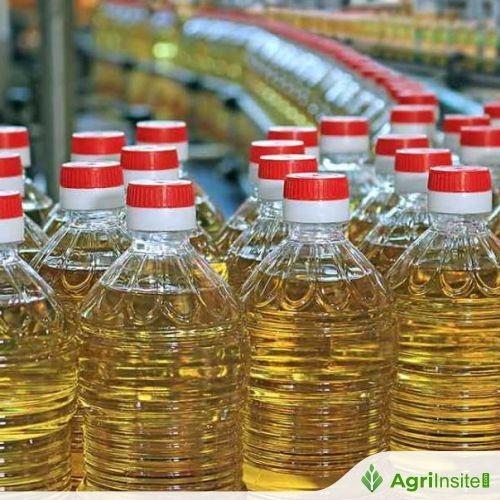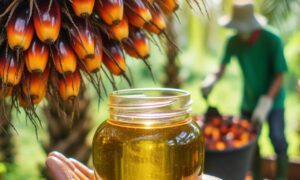Bangladesh consumers yet to benefit from edible oil price fall in global mkt

Edible oil prices have fallen globally, but Bangladeshi consumers see no relief as local prices remain high. Importers and traders are retaining the margin, creating a large gap between import, wholesale, and retail rates. Authorities and consumer groups are urging stronger monitoring and policy support to reduce dependence on imports.
Bangladeshi consumers are having no benefit from the significant fall in edible oil prices in the global market as prices of the commodity are still higher in the domestic market.
Prices of edible oil, both palm and soybean, have been declining gradually for the last four/five months but the trend is not being imitated in the Bangladeshi kitchen markets.
Market observers said importers and traders are eating up all the benefits of the global price reduction of cooking oil.
However, importers said they were maintaining the shipment price.
Soybean oil has been selling at Tk 96-105 per litre (loose) and at Tk 115-117 per litre (bottled) at retail markets across the country for the last four months.
Price of palm is Tk 82-86 (super) and Tk 74-78 (normal) per litre at retail markets, according to sources in the city.
The price of soybean increased by Tk 2-3 per litre (both loose and bottled) in May, according to the Department of Agricultural Marketing (DAM).
An official at the DAM said prices of edible oil including soybean and palm have been decreasing gradually for the last four/five months in the global market.
He said price of soybean oil witnessed 4 to 6.5 per cent reduction gradually from May while palm oil witnessed 6 to 7 per cent decline for the last five months.
“Soybean price cost Tk 65-72 per kg to an importer considering the prices from May to August,” he said.
“Palm (best quality) cost an importer not more than Tk 60-65 per kg considering the prices between March and August,” he said.
“There has been an unusual price gap from import level to wholesale level and from wholesale to retail level,” he said.
When contacted, president of Bangladesh Edible Oil Wholesale Merchants Association Hazi Mohammad Golam Maula told the FE that the price gap between wholesale level and retail level is now Tk 25-30 per litre.
He said soybean price is Tk 2,985 per maund (37.32 kg), super palm Tk 2,470-2,480, palm Tk 2,375-2,380 per maund at Moulvibazar in the city.
“And bottled soybean oil of different brands was selling at Tk 115-117 per litre and Tk 560-565 per five-litre jar,” he said.
He said per litre soybean oil now costs a retailer Tk 71-72, but they are selling the same at Tk 96 to Tk 102.
He said there is difference between per kilogram (1000 gm) and per litre of edible oil and there lies a great dodging.
He said in explanation that as per the density of edible oil and the traditional instruments of measurement, 910 gram is equivalent to one litre of soybean or palm oil sold in the country.
“Considering this, the difference between wholesale and retail levels of soybean is now nearly Tk 30-40 (loose to bottled) per litre,” he said.
Hazi Maula said the ministry of commerce (MoC), the Tariff Commission and other government organisations will have to take immediate action relating to the matter.
When contacted, general manager (finance) of City Group, sole company of edible oil brand ‘Teer’, Biswajit Saha said the private companies are reducing the price of edible oil gradually in the country for the last eight months.
He claimed that per litre bottled soybean was Tk 127 (MRP) in December 2013 which is being reduced.
He also said the invoice price of the bottled soybean oil is now Tk 105 per litre and their MRP is Tk 114 per litre.
Senior officer (sales admin) of Bangladesh Edible Oil Ltd (BEOL), a concern of leading cooking oil brand Rupchanda, Md Mofakkharul said they were selling the oil imported at higher prices as per the past L/Cs (letters of credit) opened before July.
According to the global trade web portals, soybean price was US $780-800 per tonne (1000 kg) on September 2 and palm oil price was below $700 per tonne.
The price of soybean was $890-900 per tonne in April which started to decline gradually per month and was sold at $810-780 per tonne from July to August, data of IndexMundi, a global commodity web portal showed.
It showed price of palm oil (best quality) was $860 per tonne in March which decreased to $720 in September and it was $760-750 per tonne in July-August.
When asked, chairman of Bangladesh Tariff Commission Md Iqbal Khan Chowdhury also echoed that the private companies should reduce the edible oil price immediately.
He said they have included the matter in the monthly report (August) of the commission submitted to the MoC.
Consumers Association of Bangladesh Secretary Humayun Kabir Bhuiyan said the importers should reduce the price at least in September following the global prices of June-July.
“Price of shipment to retail level should be monitored strictly by the government agencies,” he said.
Farm economist Golam Hafiz Kennedy said prices of commodities including edible oil, sugar, onion, garlic, ginger or even chilli are much higher considering the import level to retail level prices.
Edible oil market is now totally dependent on import which gives the few big traders opportunity to dominate the market.
Besides, strict monitoring, local capacity building should be increased to reduce import dependency.
He said the country now imports more than 1.6 million tonnes of edible oil out of the demand for 1.8 million tonnes.
“Bangladesh has the capacity to produce nearly 1.2 million tonnes of rice bran oil from the large stock of bran,” he said.
“Mustard oil, soybean and sunflower oil have also a great potentiality in the country, and we just need a proper policy,” he said.
Palm, soyabean and canola/mustard oils are the major three edible oils consumed in the country.
To Read more about Edible Oil News continue reading Agriinsite.com
Source : The Financial Express















